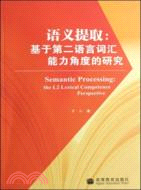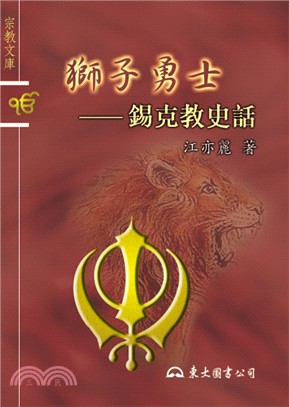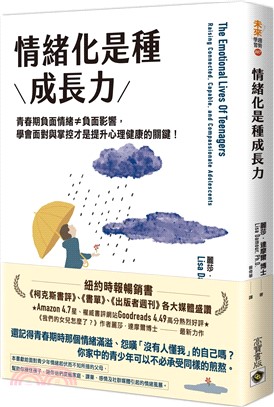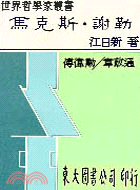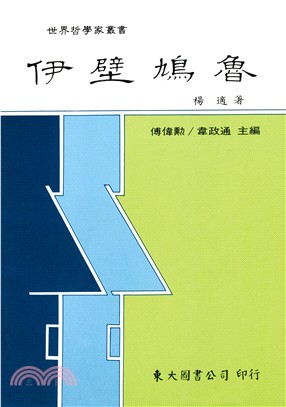相關商品
商品簡介
目次
商品簡介
本書針對雙語心理詞匯表征中“發展性變化”的現象,探究了第二語言單詞語義提取中的詞匯知識效應和工作記憶效應問題。
目次
序
ACKNOWLEDGEMENTS
ABSTRACT
CONTENTS
LIST OF TABLES
LIST OF FIGURES
Chapter 1 Introduction
1.1 Research orientation
1.2 Target of research
1.3 Rationale and research questions
1.4 Definitions of key terms
1.4.1 Bilingual
1.4.2 L2 vocabulary knowledge
1.4.3 Conceptual and semantic processing
1.4.4 Working memory capacity
1.5 Organization of the thesis
Chapter 2 Literature Review
2.1 The bilingual mental lexicon
2.1.1 Organization of mental lexicon
2.1.2 Views of the relations between the L1 and the L2 mental lexicon
2.1.2.1 Independency of the L1 and the L2 mental lexicon
2.1.2.2 Interdependency of the L1 and the L2 mental lexicon
2.1.2.3 Summary
2.2 The revised hierarchical model
2.2.1 Evidence in support of the revised hierarchical model
2.2.2 Evidence challenging the revised hierarchical model
2.2.3 Evidence against the revised hierarchical model
2.2.4 Summary
2.3 Two experimental tasks in studies of mental lexicon
2.3.1 The primed lexical decision task and its confounding processes
2.3.2 Word association tasks and major findings
2.3.3 Summary
2.4 Vocabulary knowledge and measures
2.4.1 Breadth and depth of vocabulary knowledge
2.4.2 Measures of vocabulary knowledge
2.4.3 Summary
2.5 Working memory
2.5.1 Baddeley & Hitchs working memory model
2.5.2 Working memory and the central executive
2.5.3 Working memory capacity and language processing
2.5.4 Measures and construct of working memory
2.5.4.1 Measures of working memory
2.5.4.2 Unitary versus multicomponential system of working memory
2.5.5 Summary
Chapter 3 Central Ideas
3.1 Bilingual lexical access
3.1.1 Lexical access in monolingual literature
3.1.2 Central issues of bilingual lexical access
3.2 L2 lexical competence and the goal of L2 lexical development
3.2.1 Proposals of lexical competence in the existing literature
3.2.2 A tri-component framework of L2 lexical competence
3.2.3 The goal of L2 lexical development
3.3 A developmental view of bilingual processing
3.4 Summary
Chapter 4 Effects of L2 Vocabulary Knowledge
4.1 Experiment 1
4.1.1 Hypotheses and predictions
4.1.2 Method
4.1.2.1 Subjects
4.1.2.2 Materials
4.1.2.3 Procedure
4.1.3 Results
4.1.4 Discussion
4.1.5 Conclusion
4.2 Experiment 2
4.2.1 Hypotheses and predictions
4.2.2 Method
4.2.2.1 Subjects
4.2.2.2 Materials and procedure
4.2.2.3 Classifications
4.2.3 Results
4.2.4 Discussion
4.3 Summary
Chapter 5 Effects of Working Memory Capacity
5.1 Research questions
5.2 Method
5.2.1 Subjects
5.2.2 Materials and procedure
5.3 Analyses and results
5.3.1 ANOVA results
5.3.1.1 Results of the three-way ANOVA with repeated measures
5.3.1.2 Results of the two-way ANOVA with repeated measures for the high group
5.3.1.3 Results of the two-way ANOVA with repeated measures for the low group
5.3.2 Correlation analyses
5.4 Discussion
5.4.1 Working memory capacity, processing in a second language and L2 vocabulary knowledge
5.4.2 Working memory capacity and L2 vocabulary knowledge
5.5 Summary
Chapter 6 General Discussion and Conclusion
6.1 Discussion on the major findings
6.1.1 How does the development of L2 vocabulary knowledge modify access to word meanings represented in the L2 mental lexicon of Chinese learners of English?
6.1.2 Are there any differences in semantic and associative link patterns in the lexical networks represented in the L2 mental lexicon?
6.1.3 How do individual differences in working memory capacity constrain access to word meanings in the L2 mental lexicon?
6.1.3.1 Frequency effects in L2 semantic processing
6.1.3.2 Task effect of the primed lexical decision
6.1.4 Are there any correlations between the development of L2 vocabulary knowledge and individual differences in the working memory capacity?
6.1.5 Summary
6.2 Nature of a developing L2 mental lexicon and importance of the tri-component framework of L2 lexical competence
6.2.1 A developing second language mental lexicon from the perspective of L2 lexical competence
6.2.2 Construct of L2 lexical competence
6.3 Conclusion
6.4 Implications
6.4.1 Implications for the acquisition of second language vocabulary knowledge in a Chinese classroom context
6.4.2 Implications for the development of L2 lexical networks in a Chinese classroom context
6.5 Suggestions for future research
APPENDICES
REFERENCES
ACKNOWLEDGEMENTS
ABSTRACT
CONTENTS
LIST OF TABLES
LIST OF FIGURES
Chapter 1 Introduction
1.1 Research orientation
1.2 Target of research
1.3 Rationale and research questions
1.4 Definitions of key terms
1.4.1 Bilingual
1.4.2 L2 vocabulary knowledge
1.4.3 Conceptual and semantic processing
1.4.4 Working memory capacity
1.5 Organization of the thesis
Chapter 2 Literature Review
2.1 The bilingual mental lexicon
2.1.1 Organization of mental lexicon
2.1.2 Views of the relations between the L1 and the L2 mental lexicon
2.1.2.1 Independency of the L1 and the L2 mental lexicon
2.1.2.2 Interdependency of the L1 and the L2 mental lexicon
2.1.2.3 Summary
2.2 The revised hierarchical model
2.2.1 Evidence in support of the revised hierarchical model
2.2.2 Evidence challenging the revised hierarchical model
2.2.3 Evidence against the revised hierarchical model
2.2.4 Summary
2.3 Two experimental tasks in studies of mental lexicon
2.3.1 The primed lexical decision task and its confounding processes
2.3.2 Word association tasks and major findings
2.3.3 Summary
2.4 Vocabulary knowledge and measures
2.4.1 Breadth and depth of vocabulary knowledge
2.4.2 Measures of vocabulary knowledge
2.4.3 Summary
2.5 Working memory
2.5.1 Baddeley & Hitchs working memory model
2.5.2 Working memory and the central executive
2.5.3 Working memory capacity and language processing
2.5.4 Measures and construct of working memory
2.5.4.1 Measures of working memory
2.5.4.2 Unitary versus multicomponential system of working memory
2.5.5 Summary
Chapter 3 Central Ideas
3.1 Bilingual lexical access
3.1.1 Lexical access in monolingual literature
3.1.2 Central issues of bilingual lexical access
3.2 L2 lexical competence and the goal of L2 lexical development
3.2.1 Proposals of lexical competence in the existing literature
3.2.2 A tri-component framework of L2 lexical competence
3.2.3 The goal of L2 lexical development
3.3 A developmental view of bilingual processing
3.4 Summary
Chapter 4 Effects of L2 Vocabulary Knowledge
4.1 Experiment 1
4.1.1 Hypotheses and predictions
4.1.2 Method
4.1.2.1 Subjects
4.1.2.2 Materials
4.1.2.3 Procedure
4.1.3 Results
4.1.4 Discussion
4.1.5 Conclusion
4.2 Experiment 2
4.2.1 Hypotheses and predictions
4.2.2 Method
4.2.2.1 Subjects
4.2.2.2 Materials and procedure
4.2.2.3 Classifications
4.2.3 Results
4.2.4 Discussion
4.3 Summary
Chapter 5 Effects of Working Memory Capacity
5.1 Research questions
5.2 Method
5.2.1 Subjects
5.2.2 Materials and procedure
5.3 Analyses and results
5.3.1 ANOVA results
5.3.1.1 Results of the three-way ANOVA with repeated measures
5.3.1.2 Results of the two-way ANOVA with repeated measures for the high group
5.3.1.3 Results of the two-way ANOVA with repeated measures for the low group
5.3.2 Correlation analyses
5.4 Discussion
5.4.1 Working memory capacity, processing in a second language and L2 vocabulary knowledge
5.4.2 Working memory capacity and L2 vocabulary knowledge
5.5 Summary
Chapter 6 General Discussion and Conclusion
6.1 Discussion on the major findings
6.1.1 How does the development of L2 vocabulary knowledge modify access to word meanings represented in the L2 mental lexicon of Chinese learners of English?
6.1.2 Are there any differences in semantic and associative link patterns in the lexical networks represented in the L2 mental lexicon?
6.1.3 How do individual differences in working memory capacity constrain access to word meanings in the L2 mental lexicon?
6.1.3.1 Frequency effects in L2 semantic processing
6.1.3.2 Task effect of the primed lexical decision
6.1.4 Are there any correlations between the development of L2 vocabulary knowledge and individual differences in the working memory capacity?
6.1.5 Summary
6.2 Nature of a developing L2 mental lexicon and importance of the tri-component framework of L2 lexical competence
6.2.1 A developing second language mental lexicon from the perspective of L2 lexical competence
6.2.2 Construct of L2 lexical competence
6.3 Conclusion
6.4 Implications
6.4.1 Implications for the acquisition of second language vocabulary knowledge in a Chinese classroom context
6.4.2 Implications for the development of L2 lexical networks in a Chinese classroom context
6.5 Suggestions for future research
APPENDICES
REFERENCES
主題書展
更多
主題書展
更多書展本週66折
您曾經瀏覽過的商品
購物須知
大陸出版品因裝訂品質及貨運條件與台灣出版品落差甚大,除封面破損、內頁脫落等較嚴重的狀態,其餘商品將正常出貨。
特別提醒:部分書籍附贈之內容(如音頻mp3或影片dvd等)已無實體光碟提供,需以QR CODE 連結至當地網站註冊“並通過驗證程序”,方可下載使用。
無現貨庫存之簡體書,將向海外調貨:
海外有庫存之書籍,等候約45個工作天;
海外無庫存之書籍,平均作業時間約60個工作天,然不保證確定可調到貨,尚請見諒。
為了保護您的權益,「三民網路書店」提供會員七日商品鑑賞期(收到商品為起始日)。
若要辦理退貨,請在商品鑑賞期內寄回,且商品必須是全新狀態與完整包裝(商品、附件、發票、隨貨贈品等)否則恕不接受退貨。




